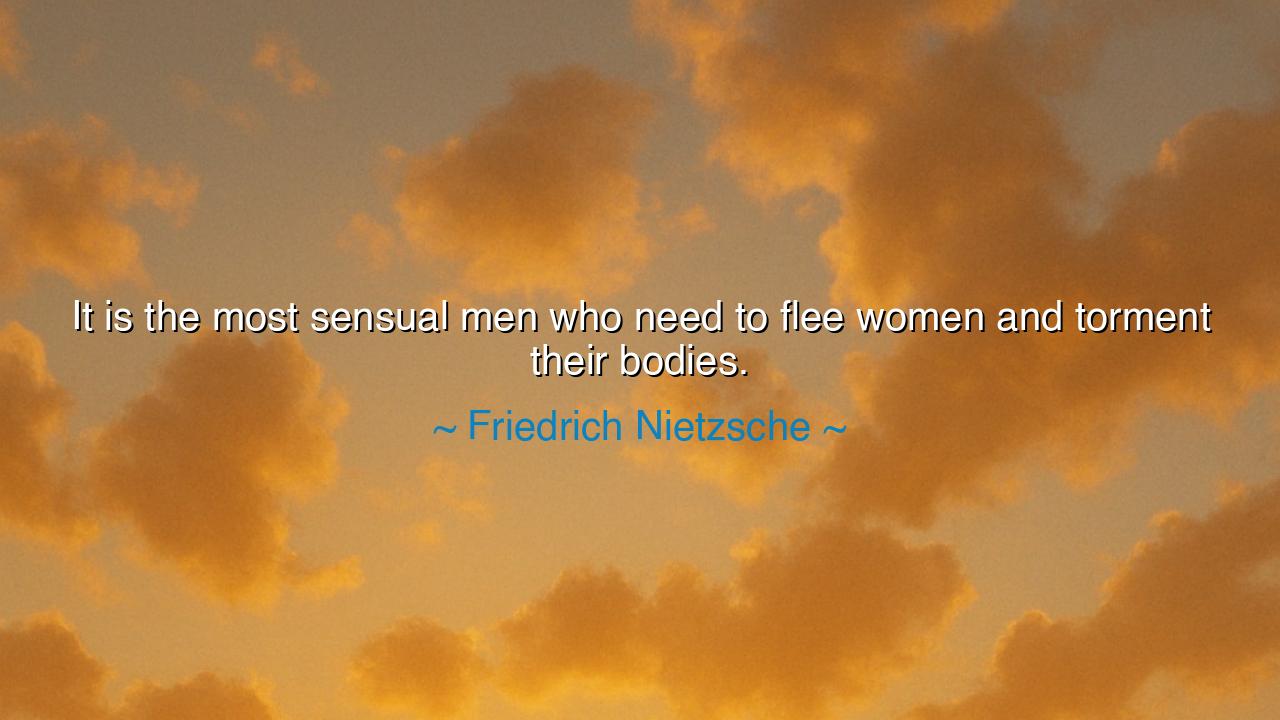
It is the most sensual men who need to flee women and torment






Hear, O seekers of the hidden fire within man, the unsettling yet profound words of Friedrich Nietzsche: “It is the most sensual men who need to flee women and torment their bodies.” In this utterance, he speaks of the eternal struggle between passion and discipline, between indulgence and transcendence. For the man whose blood burns with desire must either be consumed by it or master it through renunciation.
The most sensual men, those who feel the world most deeply, are often those who sense danger in surrendering to their longings. Thus, they flee women, not from disdain but from fear of being undone, enslaved by passion. To torment the body through asceticism, denial, or discipline is their attempt to channel that energy upward—toward art, philosophy, or power—lest it be squandered in fleeting pleasures. Nietzsche here unmasks a paradox: that strength often arises from restraint, and greatness is forged in the furnace of denied desire.
History offers us examples. Consider St. Augustine, who in his youth drowned in sensuality, yet later fled to the Church, declaring, “Make me chaste, Lord—but not yet.” His eventual asceticism and theology shaped Christianity for centuries. Or think of the monks of old, who withdrew to deserts and caves, denying their flesh so they might focus on the divine. Their torment of the body was not hatred of life, but a means to discipline passions too powerful to ignore.
So too in art and philosophy. Many creators, burdened by deep sensual drives, sought refuge in solitude, celibacy, or rigid routines. Their denial of the flesh became fuel for the pen, the canvas, or the idea. The energy they fled from in women they transmuted into visions that outlived them. Thus Nietzsche reveals that the same flame that can burn a man into ruin can also, if harnessed, illuminate the world.
Therefore, let this wisdom endure: the most powerful desires must either be mastered or they will master us. The sensual man, by fleeing temptation and disciplining his flesh, does not deny life but redirects its fire. Nietzsche’s words, fierce and unsettling, remind us that greatness often demands sacrifice, and that the path to power is carved not only by indulgence, but by the hard art of restraint.






NNNguyen Luu Nhat Nguyen
In this quote, Nietzsche seems to suggest that the men most connected to their desires may be the ones most afraid of their own bodies. Does this mean that embracing sensuality in its full form could lead to an overwhelming need for control? How do we reconcile intense sensuality with emotional or psychological peace? Is it possible to engage with desire without feeling the need to flee or suppress it?
LAtran lan anh
Nietzsche’s reflection on the relationship between sensuality and self-denial is intriguing. Is it that the most sensual men, aware of their desires, try to master them through denial, or is it that they seek distance because the constant pull of desire is too much to handle? Can true fulfillment ever be achieved through such denial, or is this merely a reflection of the struggle between the body and the mind?
HALe Ha Anh
This Nietzsche quote suggests that there’s an inherent tension between sensuality and self-mastery. Does it imply that those with intense sensual experiences might feel trapped by them? Could it be that the more we embrace our desires, the more we recognize their power over us, leading to a desire to flee from them? How do we strike a balance between embracing sensuality and maintaining self-control in our lives?
MDVu Thi My Duyen
Nietzsche’s statement presents a paradox—those who are most in touch with their sensuality might be the ones who seek to escape it. Why do you think this is? Does it suggest that indulgence in physical pleasure leads to inner conflict, or perhaps a fear of losing control? Can self-discipline in such cases ever truly be attained by denying these desires, or does it only create more tension?
VHVu Hoang
This quote from Nietzsche seems to highlight an internal conflict: the more one is in tune with their sensuality, the more they may feel the need to retreat from it. Does this imply that true self-control is achieved by denying one’s desires? Or is it more about the discomfort of vulnerability, as being so connected to one’s sensuality might feel overwhelming or even dangerous?